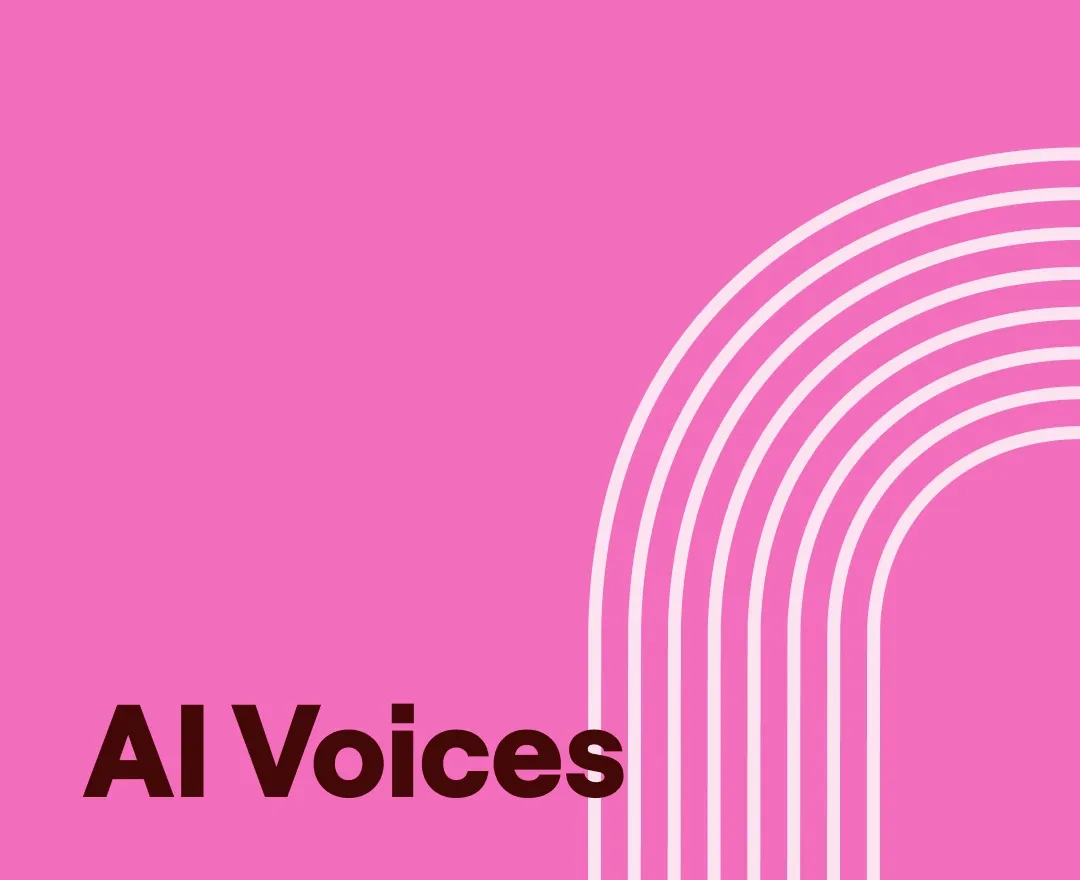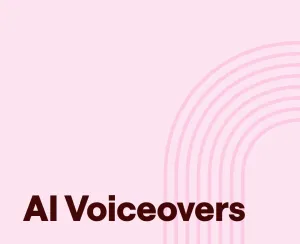AI voice technology, also known as voice synthesis or text-to-speech, is a field of artificial intelligence that focuses on creating human-like speech using high-tech methods. Through a combination of advanced algorithms and machine learning, AI voices can interpret and convert written text into spoken words, offering a revolutionary way for computers and other electronic devices to interact with users through speech.
Though computer voices started off rather crude and basic (think “Shall we play a game?” from the 1983 film “Wargames”), the field has advanced rapidly in just the last decade. The technology has improved its ability to understand and emulate the subtleties of human speech, capturing nuances that have resulted in remarkably lifelike and expressive AI-generated voices.
What is an AI voice?
An AI voice refers to a voice that is generated or synthesized using artificial intelligence (AI) technologies, typically from text input or other data sources. AI voice technology has advanced significantly in recent years, allowing computers to generate human-like speech that can be used in various applications.
How are AI voices made? The Science Behind AI Voices
The development of AI voices involves many cutting-edge disciplines, but the methods used can be broken down into three main approaches:
1) Machine Learning Algorithms
At the heart of most examples of artificial intelligence lie powerful machine learning algorithms that enable machines to learn from data and improve their performance over time. Supervised learning is often employed to train AI voice models using large datasets of human speech. These datasets serve as a rich source of linguistic patterns, phonetic structures, and speech dynamics.
Through supervised learning, the AI model learns to recognize patterns and correlations between textual inputs and corresponding speech outputs. The AI learns from lots of examples of human speech and adjusts its settings, like tuning a musical instrument, to make its own speech sound as close as possible to that of a real human. As the model processes more data, it refines its understanding of phonetics, intonations, and other speech characteristics, leading to increasingly natural and expressive AI voices.
2) Natural Language Processing
Natural Language Processing (NLP) is a fundamental aspect of AI voice technology that enables machines to understand and interpret human language. Using NLP techniques allows AI to act like a language detective, breaking down written words and sentences to find important details, such as grammar, meaning, and emotions. NLP allows AI voices to interpret and speak complex sentences, even when words have multiple meanings or sound the same.
It's like having a language expert on hand to make sure the AI voice sounds natural and makes sense, no matter the type of language used. NLP is the magic that bridges the gap between written words and spoken speech, making AI voices sound just like real humans, even when dealing with tricky language patterns.
3) Speech Synthesis Techniques
Speech synthesis techniques are at the heart of AI voices, allowing machines to turn processed text into understandable and expressive speech. There are different ways to do this, like piecing together recorded speech to make sentences (concatenative synthesis) or using math models to create speech (parametric synthesis), which allows for more customization.
In recent times, a groundbreaking method called neural TTS (Text-to-Speech) has emerged. It uses deep learning models, like neural networks, to generate speech from text. This technique has made AI voices sound even more natural and expressive, capturing the tiny details that make human speech unique, like rhythm and tone. Thanks to neural TTS, AI voices now sound so lifelike that it's hard to tell them apart from human voices. This is a big step forward in making AI voices sound more human-like and engaging.
AI Voices in Our Daily Life
With machine learning algorithms unraveling linguistic patterns, NLP decoding the complexities of language, and speech synthesis techniques crafting expressive voices, AI voices have come a long way. These impressive advancements have led to uses in different industries and have changed the way we interact with everyday technology, like:
Virtual Assistants
AI voices have become an integral part of our daily lives through virtual assistants like Siri, Alexa, Google Assistant, and Cortana. These virtual helpers reside in our smartphones, smart speakers, and other devices, ready to respond to our voice commands and provide valuable information in startlingly human intonations. Their ability to understand natural language and provide contextually relevant answers has made them indispensable companions in our fast-paced world.
GPS Navigation Systems
Next time you embark on a road trip or navigate through unfamiliar streets, take a moment to appreciate the AI voice guiding you. GPS navigation systems leverage AI voice technology to offer turn-by-turn directions like an alert friend sitting in the passenger seat with the map, ensuring you reach your destination safely and efficiently without taking your eyes off the road. With real-time traffic updates and intuitive route suggestions, AI voices have become the constant companion of drivers heading out on the highway.
Customer Service
In the realm of customer service, AI voices are changing the way businesses interact with their clients, particularly through the integration of AI in contact centers. Interactive voice response systems equipped with AI voices are handling customer inquiries and directing calls to the appropriate departments. They can offer personalized and automated responses that are more flexible than “press one for billing…”, reducing waiting times and providing round-the-clock support. This is especially beneficial for customer service outsourcing companies, where efficiency and 24/7 availability are critical. AI voices are becoming more adept at understanding complex queries and delivering natural, human-like responses, making calls to your insurance company or the DMV more efficient, if not necessarily any more enjoyable.
These and other AI voice applications have smoothly integrated into our lives, significantly improving convenience and accessibility.
Consumer Uses For AI Voice Technology
While AI voices have already become integral to our lives through virtual assistants and navigation systems, their uses don’t end there. With the recent revolution in generative AI products available to ordinary people, individual consumers and small businesses now have the power to harness AI voices to better their lives and express their creativity.
1) Accessibility
One of the most impactful applications of AI voices is in enhancing accessibility for individuals with visual impairments or reading difficulties. Through text-to-speech technology, AI voices can convert written content into spoken words, providing an audio representation of text-based information. This empowers those with visual challenges to access digital content, including websites, articles, and documents, with ease. Moreover, AI voices can be integrated into assistive devices, enabling users to interact with technology through voice commands, fostering independence and inclusivity.
2) Podcasting
AI voices are revolutionizing the world of podcasting, offering content creators new possibilities for narration and storytelling. Podcasters can leverage AI voices to streamline the production process by converting written scripts into spoken content, saving time and resources. Additionally, AI voices can provide consistent and reliable narration, eliminating the need for multiple takes or re-recordings. The result is a seamless and engaging listening experience that captivates audiences with expressive and lifelike AI-generated voices.
Imagine an Australian voice setting the laid-back tone of a beachside true crime series, or a deep, commanding male voice guiding listeners through a suspenseful sci-fi drama. A Scottish accent might add flair to a historical tale, while a dramatic AI voice transforms an ordinary script into a gripping audio experience. With AI, the storytelling palette has never been richer. These voices don’t just read scripts; they shape mood, pace, and emotion. With AI, podcasters can experiment, adapt, and truly customize their sound, crafting episodes that resonate from intro to sign-off.
3) Voiceover Work
In the realm of multimedia production, AI voices are making their mark in voiceover work. Traditionally, hiring human voice actors for narration, commercials, or animated content can be time-consuming and costly. However, with AI voices, small businesses and content creators can generate custom voiceovers on demand. This opens up opportunities for personalized voice branding, where companies can establish a distinct and recognizable voice identity for their products and services. Moreover, AI voices can adapt to various languages and accents, catering to diverse global audiences.
The same expressive voices used in podcasting - whether dramatic, regional, or authoritative - are just as impactful in voiceovers, offering flexibility across genres and moods. If the content calls for excitement and energy, like a sports promo, a bold sports announcer voice can set the tone. And when speaking to the Arabic market, an authentic Arabic-accented voice can build trust and cultural familiarity. AI voices make it possible to craft content that not only sounds professional but connects with audiences around the world.
4) Audiobook Creation
The audiobook industry has witnessed a significant transformation with the integration of AI voices. Authors and publishers can now explore new avenues for audiobook creation and distribution. AI voices facilitate the conversion of written books into captivating audiobooks, enabling authors to reach a broader audience and engage readers in an immersive listening experience. Additionally, the versatility of AI voices allows for personalized narration, where authors can lend their unique voice to the characters in their stories, adding a distinct touch to the storytelling process.
AI voices aren’t just shaking things up in podcasting and voiceovers, they’re turning pages in the world of audiobooks too. Whether it’s a moody thriller, a heartfelt memoir, or a historical epic, the same voices that work wonders elsewhere, like the dramatic, the presidential, the regional, or the richly accented, can make audiobook narration more immersive and enjoyable (okay, maybe the sports announcer voice is better left on the sidelines; but never say never!). With AI, authors and publishers can match tone to text in new, creative ways, giving stories fresh voices and listeners a reason to lean in.
From enhancing accessibility and inclusivity to revolutionizing podcasting and audiobook creation, AI voices have become indispensable tools for businesses, content creators, and individuals alike. As the technology continues to evolve, we can anticipate even more groundbreaking applications in fields like health care, education, and entertainment.
Your Voice, Your Choice: AI Voice Options
The marketplace offers consumers a range of voice technology sophistication levels to suit their preferences and requirements. From quick and hassle-free options that are readily available for immediate use to more customizable and hands-on products, here is a general overview of the current option levels:
Pregenerated Voices: Ready-Made for Quick Use
Pregenerated voices are the starting point for many consumers venturing into the realm of AI voice technology, but a good pre-generated voice has nothing “basic” about it. These voices are carefully crafted by experts, offering a selection of diverse and expressive options categorized by age, sex, and regional accent.
Businesses often opt for pre-generated voices in customer service interactions, as they provide a professional and consistent tone. Content creators may also find pre-generated voices an ideal fit for projects requiring a specific voice style without the need for extensive customization. With pre-generated voices readily available, consumers can seamlessly integrate AI voices into their ventures and elevate the user experience with minimal effort.
Customizable Voices: Tailoring Voices to Match Your Need
For those seeking a touch of uniqueness and personalization, customizable voices offer a dynamic approach to voice synthesis. Starting from their stable of pre-generated voices, some AI voice platforms allow consumers to adjust parameters such as pitch, tone, and pacing to create a voice that aligns with their desired delivery.
Want a narrator who’s sultry and seductive for your audiobook? No problem. Need a character in your dramatic podcast to sound scared and a little confused? All you need to do is tweak the dial or make a selection on a pulldown menu. Additionally, individuals can enjoy the liberty of infusing their personalities into their virtual assistants or voice messages, fostering a stronger emotional connection with their AI-powered companions.
Voice Cloning: Your Voice, Amplified by AI
Voice cloning is the pinnacle of AI voice personalization, revolutionizing the way we interact with technology. This cutting-edge process allows a user to make a digital copy of their own voice, which they can then use to produce audio content by simply typing up a text document. Whether for podcast voiceovers or audiobook narration or any of a dozen other uses, voice cloning blurs the lines between human speech and technology like nothing else before it.
While brands and big businesses have employed voice cloning to replicate the sound of iconic spokespersons or celebrities for a while now, it's only been relatively recently that the technology has become widely available to the regular consumer. For those who are curious about voice cloning and want to give it a try, Podcastle has developed a lifelike voice cloning tool that is available to all Pro accounts.
To get started with Revoice, users simply record a short voice sample along with a legal disclaimer for safety and privacy protection — enabling them to clone their voice in a matter of seconds and ensuring that only the intended user’s voice will be recorded. Once all the sentences have been recorded and submitted, Podcastle’s AI-powered learning algorithm crunches the data and produces a digital copy of the user’s voice within 24 hours.
The Future and Ethical Considerations of AI Voice Technology
The horizon of AI voice applications stretches far beyond our current imagination, promising groundbreaking ventures in healthcare, therapy, education, and more. Imagine personalized healthcare support, virtual therapy sessions, and engaging educational content tailored to individual learning styles, all brought to life by the power of AI voices. The future potential is immense.
However, with great potential comes great responsibility. Ethical considerations are important sticking points in the world of AI voice synthesis. Privacy and data protection must take center stage in development, ensuring user trust and safeguarding sensitive information from potential misuse and impersonation. Transparency and secure data practices are essential to building a foundation of ethical AI voice applications.
Moreover, as AI voices continue to evolve, we must grapple with their impact on human employment. There are concerns about possible job displacement for human voice actors and customer service representatives as AI voices become more sophisticated. Striking a balance between AI use and human oversight and collaboration will be crucial.
In conclusion, the future of AI voice technology is wide open, with limitless possibilities to revolutionize industries and human lives. By combining innovation with ethical considerations, we can unlock the full potential of AI, creating a future that is not only technologically advanced but also ethically sound, ensuring a world where AI voices enrich our lives while upholding principles of privacy, fairness, and inclusivity.










